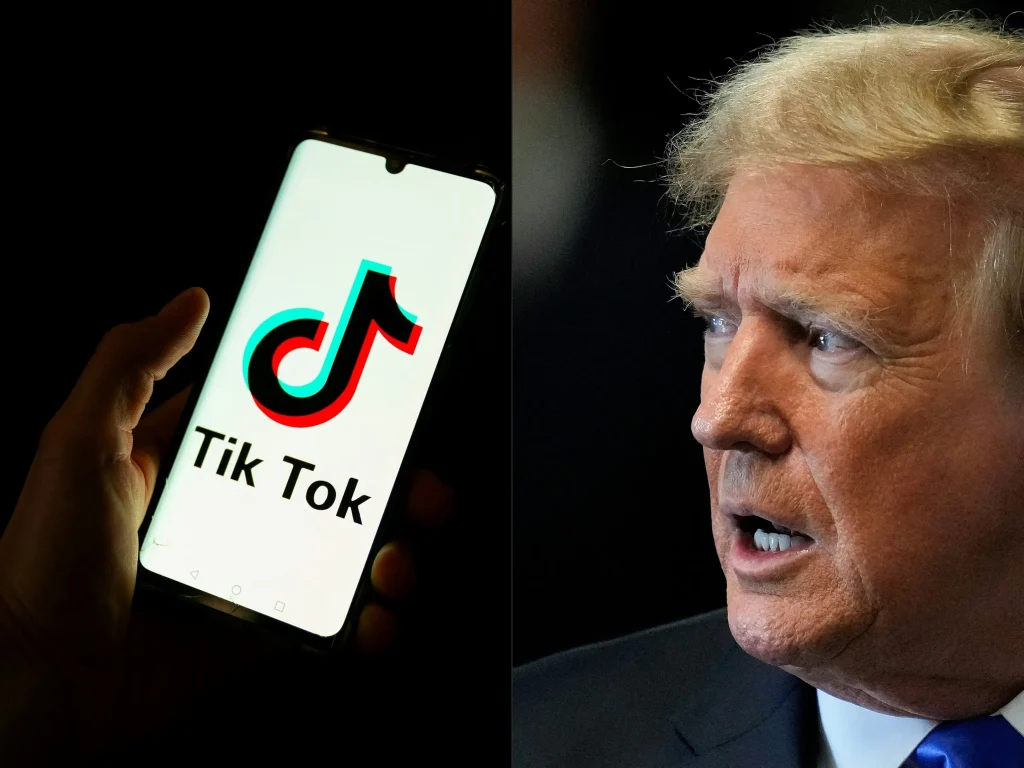The potential Trump TikTok sale has created significant buzz, with President Donald Trump recently announcing in a Fox News interview that a group of “very wealthy people” is prepared to purchase the popular video-sharing app. This announcement comes amidst ongoing discussions regarding TikTok’s operations in the U.S., which have been marred by uncertainty since the introduction of the paired divestiture requirement for its Chinese parent company, ByteDance. While Trump suggested that approval from Beijing may be necessary for the TikTok divestiture to proceed, he expressed optimism that President Xi Jinping would cooperate. The fate of TikTok hangs in the balance as new regulations threaten its existence unless a satisfactory deal is reached. With major players like Oracle’s Larry Ellison eyeing the acquisition, the future trajectory of TikTok’s U.S. operations remains a hot topic in both corporate and political arenas, making it essential to stay abreast of developments regarding this intriguing transaction.
In the recent whirlwind of news surrounding the TikTok divestiture, U.S. President Donald Trump’s remarks have ignited discussions about a possible sale of the platform to American investors. The high-stakes nature of this scenario has a direct connection to the broader implications of foreign-owned applications operating within the U.S. market. Amid continuing scrutiny, the potential acquisition also hints at the challenges and regulatory hurdles facing ByteDance, the parent company of TikTok, as it navigates U.S. laws. Speculation about involved parties, including prominent figures in technology and business, adds an element of intrigue to this unfolding narrative. As recent developments surface, understanding the ramifications of such negotiations is paramount for anyone invested in the dynamics of digital media and international trade.
Trump TikTok Sale: A Potential Shift in Ownership
In a recent Fox News interview, President Donald Trump hinted at a potential sale of TikTok, emphasizing that a group of “very wealthy people” is poised to make a move on the popular app. This discussion comes amid ongoing scrutiny regarding the app’s ownership, given its ties to Beijing-based ByteDance. The U.S. government has mandated that ByteDance divest its U.S. operations to comply with national security concerns raised by the platform’s data privacy practices. The President’s assurance over the identity of the buyers within two weeks adds an intriguing layer to the TikTok divestiture process.
However, any prospective deal will face hurdles, particularly concerning the necessary approval from the Chinese government. Trump appears optimistic, suggesting that President Xi may permit the transaction, but this remains uncertain. The context of Trump’s discussion underscores an urgent desire to find a solution, as immunity from the reciprocal tariffs he proposed previously hangs in the balance. With the latest deadline for ByteDance’s divestiture set for September 17, 2024, time is ticking for a resolution that satisfies all parties involved.
The Uncertain Future of TikTok’s U.S. Operations
The fate of TikTok’s U.S. operations remains precariously poised between potential buyers and regulatory constraints. The Protecting Americans from Foreign Adversary Controlled Applications Act (PAFACA) sets the stage for strict guidelines that any new ownership must follow. These regulations emerged following a law passed in 2024 that mandates a complete divestiture from ByteDance for TikTok to operate legally in the U.S. With Trump extending the deadline multiple times, stakeholders are closely monitoring how this situation unfolds, particularly as the deadline approaches.
Industry experts are already speculating on the implications of a ByteDance sale, especially considering previous attempts to navigate challenges imposed by the tariffs and legal frameworks. Possible bidders have included tech giants like Oracle and even up-and-coming firms such as AppLovin and Perplexity AI. As prospective buyers maneuver through this complex backdrop, the legal ramifications of ownership might complicate the negotiation process further. Ensuring compliance with PAFACA will be crucial for any transaction and the platform’s future in America.
Challenges Facing TikTok’s Potential Buyers
As interest grows among potential investors in TikTok, significant challenges loom over any prospective sale. The prospect of a TikTok divestiture raises complex questions about the value of the app versus the regulatory landscape. Trump’s remarks illustrate a clear intent to see TikTok flourish under new management, but navigating the legal intricacies tied to ownership remains a formidable task. Key players in the tech industry are evaluating whether investing in TikTok is advantageous amid a backdrop of regulatory uncertainty and the looming possibility of legal disputes under PAFACA.
Moreover, with the Chinese government holding substantial sway over ByteDance’s decision to sell, the negotiation table becomes crowded with geopolitical considerations. Past agreements indicating a foray into joint ventures between American and Chinese stakeholders have faltered amid rising tensions. Each potential buyer will need a clearly outlined strategy to address these challenges while aligning with both U.S. legal requirements and international relations. The landscape for TikTok’s ownership appears fractious, yet the allure of tapping into America’s vast user base cannot be understated.
The Legal Landscape Surrounding TikTok’s Ownership
The intricate legal landscape surrounding TikTok’s potential sale underscores the complexity of foreign technology ownership in the U.S. Following the Supreme Court’s upholding of restrictions on TikTok, the need for a ByteDance sale to compliant U.S. entities has never been more pressing. There are myriad laws and regulations that will affect how such a transaction can occur, notably PAFACA, which outlines the conditions under which foreign-owned applications may operate in the U.S. market.
Furthermore, legal experts assert that the outcome of any deal hinges not only on compliance with U.S. law but also the unparalleled requirement for approval from the Chinese government. As Trump has articulated his desire for American interests to possess significant stake in TikTok, the contradictions between national security concerns and international business interests become apparent. Thus, stakeholders must navigate a complex web of regulations, with the potential for litigation looming at every turn, making the pathway to ownership for TikTok’s U.S. operations convoluted and fraught with uncertainty.
Potential Impact of Trump’s Remarks on TikTok’s Market Value
Trump’s recent comments regarding potential buyers ready to purchase TikTok have stirred interest in the app’s market value amidst an environment of uncertainty. Speculation on who these wealthy investors might be has heightened the stakes, particularly for stakeholders concerned about the TikTok divestiture. If such a deal were to materialize, it could significantly influence TikTok’s valuation and operational strategy in the U.S. The prospect of American ownership could potentially enhance consumer trust and stabilize the app’s standing in the market.
However, the discussion surrounding ownership brings with it a blend of optimism and skepticism. Investors are keenly aware of the regulatory hurdles that await, and these factors are crucial in determining the feasibility of any transaction. The dynamics at play, including Trump’s well-publicized aspirations for the app, could play a meaningful role in either driving or undermining potential buyers’ confidence in moving forward. Therefore, the intersection of Trump’s influence and legal requirements may dictate not only TikTok’s future but also its valuation in a fast-evolving tech landscape.
What Does a TikTok Sale Mean for American Users?
The potential sale of TikTok raises critical concerns for American users, particularly regarding data privacy and the app’s continued operation in the U.S. Should a divestiture occur, users might witness changes in terms of how their data is handled and protected under a new ownership framework. The appetite for American stakeholders to manage TikTok could lead to enhanced compliance with U.S. data protection laws, delivering more assurance to users who have been apprehensive about foreign ownership being in charge of their personal information.
Additionally, the implications of a TikTok sale extend to content moderation and platform policies. Users can expect shifts in the app’s operational strategy that align more closely with U.S. norms and values. This shift could foster a user experience that feels more localized and transparent. Furthermore, Trump’s strategic positioning reflects an understanding of TikTok’s significant role in shaping public discourse, particularly among younger voters, and a successful acquisition may well cement that engagement into the future.
The Role of Public Opinion in TikTok’s Future
Public opinion holds significant sway in the discussions regarding TikTok’s potential future. As the platform has gained traction primarily among younger demographics, these users express varying views on the ownership narrative, especially in a politically charged environment. Trump’s declarations and the ensuing media coverage shape perceptions, with a blend of apprehension and hope about how ownership might shift under new American investors. This reflects broader sentiments towards data privacy, national security, and tech industry ethics.
Moreover, while some users advocate for the platform’s survival due to its creative community, others voice concerns over how regulatory and ownership changes may affect their user experience. Polls and public feedback are essential to understanding the framework that potential buyers must consider when negotiating the sale. The voices of TikTok’s robust user base will likely influence stakeholders’ strategies moving forward, ensuring that any new ownership model reflects user interests while satisfying regulatory authorities.
Key Players Eyeing TikTok’s Ownership
As speculation mounts surrounding the future of TikTok, several key players in the tech industry are positioned as potential buyers. Notably among these is Oracle’s Larry Ellison, who has significant experience in navigating complex tech deals. His interest stems from a desire to align with trends in data management and security that would benefit the platform under new leadership. Additionally, other companies such as AppLovin and Perplexity AI have shown interest in acquiring TikTok, each having their unique vision for the social media giant.
The competition among these players indicates a ripe market opportunity and a strong desire to tap into TikTok’s vast user base. However, their ambition must intersect with legal challenges posed by the current regulatory framework. Stakeholders are acutely aware that any deal would necessitate compliance with not only PAFACA but also a keen understanding of international relations, particularly with China. As these companies maneuver through this landscape, their strategies will be subjected to public scrutiny, further impacting TikTok’s resonance within the American market.
A Glimpse into the Future of TikTok Post-Divestiture
Envisioning TikTok’s trajectory post-divestiture opens up an array of possibilities for the platform’s evolution within the U.S. market. Any new ownership could lead to innovations that enhance user engagement and data protection practices. With American stakeholders at the helm, users might anticipate a series of updates aimed at compliance yet also geared towards enriching the overall experience on the platform. Such changes could reaffirm TikTok’s commitment to user safety while generating renewed interest in its unique offerings.
Furthermore, how TikTok aligns its business strategy post-sale will shape its competitiveness against rival platforms. The convergence of creativity, user engagement, and a strong governance framework will determine whether the app can sustain its popular appeal amid shifting market dynamics. As the discussions unfold, attention will be on how newly empowered stakeholders can not only navigate legal landscapes but also inspire trust among users reluctant to see their favorite app operate under foreign ownership.
Frequently Asked Questions
What is the current status of the Trump TikTok sale?
The Trump TikTok sale remains in negotiations as discussions continue among potential buyers, including wealthy individuals and companies like Oracle’s Larry Ellison. As of now, President Trump has extended the divestiture deadline for ByteDance’s U.S. operations until September 17, allowing more time for a deal.
Why is the TikTok divestiture important for U.S. operations?
The TikTok divestiture is crucial because U.S. law, particularly the Protecting Americans from Foreign Adversary Controlled Applications Act (PAFACA), mandates that ByteDance must sell its TikTok U.S. operations or face a ban. Trump’s administration emphasizes the need for the app to be owned by American stakeholders to protect user data and national security.
Who are the potential buyers for TikTok in the Trump TikTok sale?
Potential buyers for the Trump TikTok sale include high-profile individuals like Oracle’s Larry Ellison, as well as companies such as AppLovin and Perplexity AI. These parties have shown interest in acquiring TikTok’s U.S. operations amid the ongoing negotiations.
What did Trump say about TikTok during his interview with Fox News?
During his interview with Fox News, Trump stated that he has a group of “very wealthy people” ready to purchase TikTok, mentioning he could reveal their identities soon. He highlighted the importance of obtaining Beijing’s approval for any sale, while expressing optimism that President Xi would cooperate.
What legal challenges might the Trump TikTok sale face?
The Trump TikTok sale could encounter legal challenges, particularly regarding compliance with PAFACA, which governs foreign ownership of applications. Experts have suggested that the sale’s structure might face scrutiny, especially concerning how it adheres to U.S. law and protects user data.
Will the TikTok U.S. operations be sold to the U.S. government as part of the Trump TikTok deal?
There are discussions about selling a 50% stake of TikTok’s U.S. operations to the U.S. government as part of a joint venture, a proposal previously suggested by Trump. However, the specifics of such an arrangement are still under consideration and would require legal clarification.
What is the significance of Trump extending the deadline for ByteDance to divest TikTok?
By extending the deadline for ByteDance to divest TikTok, Trump aims to facilitate ongoing negotiations for the sale and reinforce the importance of ensuring that the platform operates under U.S. ownership, which he believes could benefit national security and user trust.
How might Chinese approval impact the Trump TikTok sale?
Chinese approval is a significant factor for the Trump TikTok sale because any divestiture of TikTok’s U.S. operations requires compliance with Chinese law. This may involve regulatory hurdles and negotiations, as the Chinese government controls foreign investments and tech exports.
| Key Point | Details |
|---|---|
| Trump’s Sale Claim | Trump stated he has “very wealthy people” ready to buy TikTok. |
| Beijing Approval Needed | Trump mentioned that the deal will likely need approval from the Chinese government. |
| Deadline Extensions | The deadline for ByteDance to divest from TikTok’s U.S. operations has been extended to September 17. |
| Impact of TikTok Ban | The TikTok ban is tied to the Protecting Americans from Foreign Adversary Controlled Applications Act (PAFACA). |
| Potential Buyers | Interested buyers include Oracle’s Larry Ellison and companies like AppLovin and Perplexity AI. |
| Legal Challenges | Any deal may face legal challenges related to compliance with PAFACA. |
Summary
The Trump TikTok sale has become a pivotal topic in U.S. politics as President Donald Trump announces potential buyers for the platform. If the sale proceeds, it would require approval from both American and Chinese authorities, underscoring the complexities of international business dealings. Trump’s ongoing efforts to negotiate a divestiture reflect his desire to maintain TikTok’s presence in the U.S. while navigating the legal challenges posed by recent legislation. As the deadline approaches, the future of TikTok remains uncertain.



